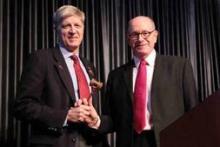Countless rheumatologists who look back on their training count Dr. James O’Dell as being among their mentors who mattered.
Such has been Dr. O’Dell’s enthusiasm for rheumatology and teaching that many young physicians in their internal medicine residency opted to leave their home states and come to Omaha to focus on rheumatology in a fellowship at the University of Nebraska with him.
One such former resident and then fellow Dr. Steve Craig tells a typical story of inspiration at the hand of Dr. O’Dell: "In my second year of [internal medicine] residency, I stumbled upon my rheumatology rotation.
"Through the course of the rotation, Dr. O’Dell spent no less than 3.5 hours each week in didactic training of the students and residents. Most of these sessions were early in the morning, so as not to interfere with typical resident duties on the rotation. He did this month after month, and has done so year after year.
"He never tires of teaching the residents, and his work shows in the results of national testing scores of his residents. In any case, I found myself not wanting to leave the rotation when the calendar turned," said Dr. Craig, now a rheumatologist in Des Moines, Iowa.
Above all else, Dr. O’Dell "believed firmly that a good rheumatologist must first be a good internist," said Dr. Craig, who noted that during his "intern year, I was impressed to discover that he and other faculty members in the rheumatology department took a month or two a year to act as the staff physician on one of the inpatient internal medicine teams."
Another former resident and then fellow, Dr. Ted R. Mikuls, of the University of Nebraska, noted of Dr. O’Dell: "Like all great mentors, Jim had a much bigger impact on the next generation of rheumatologists and internists than he could possibly imagine. Seldom a day goes by that I don’t hear echoes of lessons I’ve learned from Jim reflected in my approach to training and patient care."
Over the course of his 27 years and counting of running the Internal Medicine Residence Training Program at the University of Nebraska Medical Center in Omaha, Dr. O’Dell has directed the training of more than 600 residents.
Dr. O’Dell followed an unlikely path to a career in medicine in that his undergraduate degree from the University of Nebraska is in electrical engineering. It is difficult to imagine that such a personable man as Dr. O’Dell would be fulfilled living his life among engineers. And indeed, Dr. O’Dell saw that the path to happiness lay elsewhere. "I started college in the school of engineering and worked summers with an engineering firm and realized that I wanted and needed more direct interactions with people on a day-to-day basis. I finished my engineering degree so I would have something to fall back on if medical school didn’t go so well – as soon as I got into the clinical years I have never looked back. The engineering background is very helpful in organization and working through things logically – I think this has been particularly true for some of the research that I have done.
"In medical school I thought I would be a family physician or a surgeon and interviewed for residence in those two areas. During January of my senior year after interviewing was over I had a clear epiphany that I was cut out to be an internist! I was able to switch to an IM residence.
"The choice of rheumatology was harder – ultimately I wanted to know one area really well but at the same time continue to take care of the whole patient and not just an organ. I also wanted to follow my patients for the long-term and not just come in and out of their lives. Rheumatology gave me the opportunity to do all of this. After seeing this modeled by Dr. Art Weaver in Lincoln, Nebraska, I was sold, and as they say, the rest is history," said Dr. O’Dell, who is now the Bruce Professor of Internal Medicine, vice-chair of internal medicine, and chief of the division of rheumatology at the University of Nebraska Medical Center in Omaha as well as president of the American College of Rheumatology.
One of his mentors during his rheumatology fellowship at the University of Colorado at Denver was Dr. Herbert Kaplan, now retired. "When [Dr. O’Dell] trained there was a 30-bed rheumatology unit in the hospital. When he made rounds with me, his enthusiasm and ability to relate to patients was unusual as was his ability to soak up knowledge and work cooperatively with the nurses and myself to the patients’ benefit."


